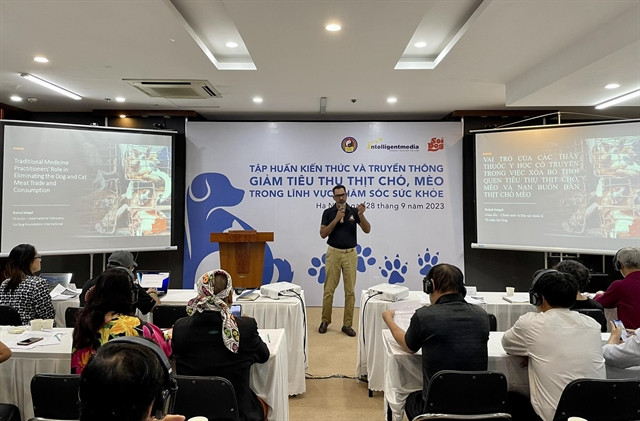 |
| Every year, about five million dogs and one million cats are brutally slaughtered for meat in Việt Nam, according to global animal welfare organisation FOUR PAWS. Photo FOUR PAWS |
The Vietnamese traditional medicine community called for stronger efforts to reduce the consumption of dog and cat meat for healthcare purposes at a training course in Hà Nội on Thursday.
The event was jointly organised by the Professional Department of Việt Nam Oriental Traditional Medicine Association (VOTMA), Soi Dog Foundation International and Social and Behaviour Change Science Agency Intelligentmedia.
In Việt Nam, dog and cat meat is associated with “nutrition” and “curing disease”, folklore that has been passed from generation to generation. That's why many people eat dog meat because they think it will improve their health.
However, doctor and traditional medicine practitioner Ngô Văn Dương, Chairman of the Việt Nam Intensive Traditional Medicine Club, said that dog and cat meat wasn’t as nutritious as people might think.
“According to traditional medicine guidance, dog and cat meat is not an cure for bone and joint-related diseases. There is no scientific evidence on the functionality of dog meat to enhance male sexual performance or cat bone marrow for better bone and muscle systems,” said Dương.
 |
|
Rahul Sehgal, Director of International Advocacy, Soi Dog Foundation International, speaks at a training course. |
“I never prescribe or recommend my patients to eat dog and cat meat as health supplements. In today’s modern world, there are a wide range of safe, nature-based and effective TM ingredients and rich food alternatives accessible to everyone,” stressed Dương.
The training event aimed to foster more robust engagement and determination from the traditional medicine sector in stamping out dog and cat meat consumption.
At the event, Rahul Sehgal, Director of International Advocacy, Soi Dog Foundation International, emphasised the importance of stopping dog and cat meat trade and consumption in order to eliminate rabies by 2030. All sectors in society should have a zero-tolerance attitude and strong social rejection against this cruelty. This would not only pressure the Government to implement stronger measures but would also threaten traders and users.
At the event, traditional medicine practitioners discussed strategic solutions for the traditional medicine sector to control the demand and consumption of dog and cat meat for healthcare motivations in Việt Nam. They also shared their opinions, identified feasible solutions, and more importantly, reached a consensus on an action plan where they will pass on knowledge and guide dog and cat meat eaters to change their behaviour.
Trainees were also provided with comprehensive knowledge and data relating to the trade and consumption of dog and cat meat, possible healthcare risks to traders and eaters, and methods and tools to advocate for the target audience group to stop their behaviour.
“It is critical to change the belief and behaviour of dog and cat traders and eaters. VOTMA, as the official voice of traditional medicine practitioners and associations, will lead the movement disseminating messaging discouraging the consumption of dog and cat meat to the TM network and the whole community,” said Trần Xuân Nguyên, Head of the Professional Department, Vietnam Oriental Traditional Medicine Association.
The event also featured the strong determination of VOTMA in tackling the issue. They urged their members, TM practitioners, students, and TM universities and clinics in Việt Nam to advocate to their peers and patients to stop the consumption of dog and cat meat for healthcare reasons.
The training ended with five traditional medicine practitioners signing a pledge against dog and cat meat trade and consumption. This is a public announcement against dog-cat meat trade and consumption and establishes a good model, which can be replicated further in the sector. — VNS